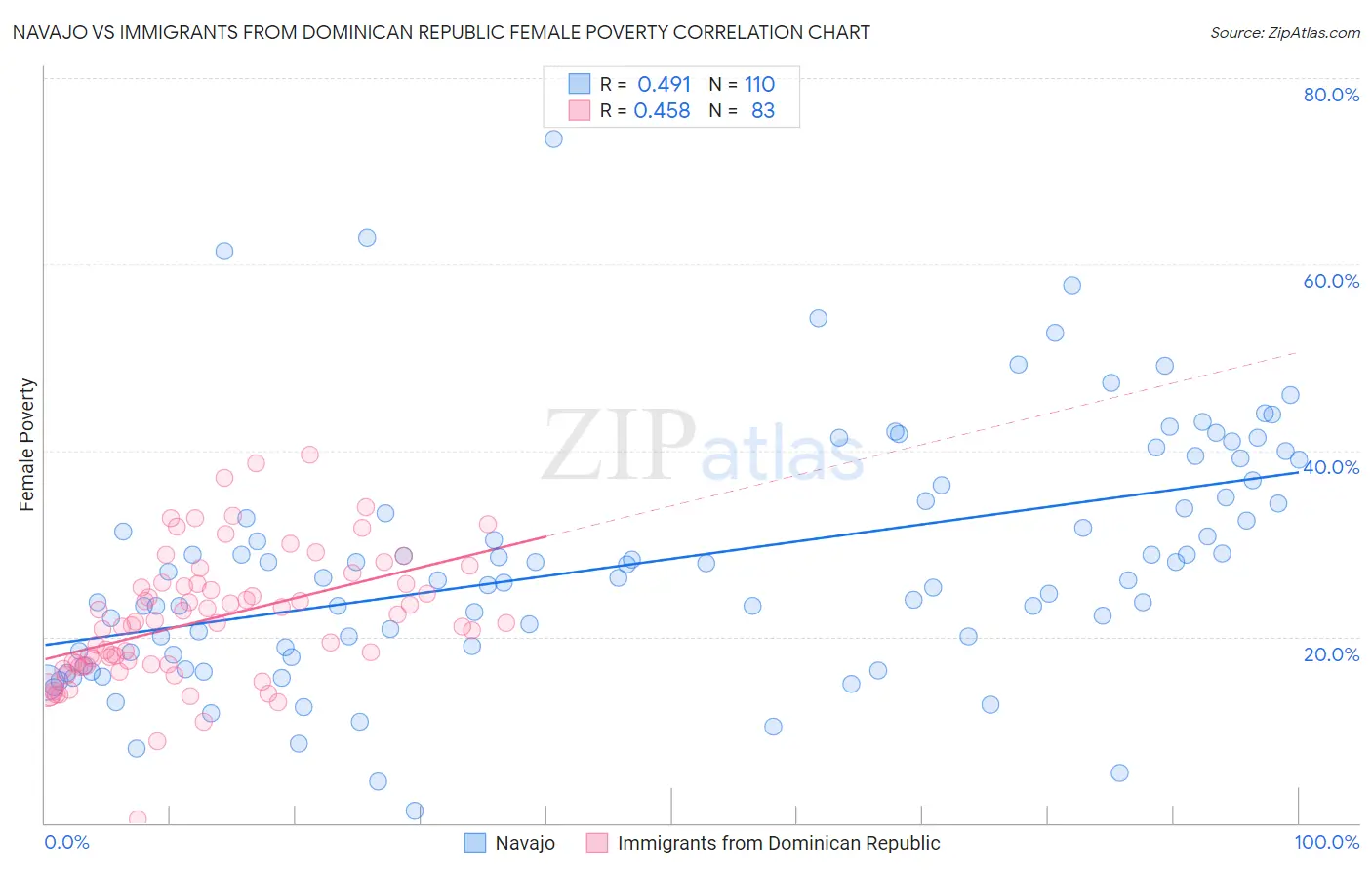Navajo vs Immigrants from Dominican Republic Female Poverty
COMPARE
Navajo
Immigrants from Dominican Republic
Female Poverty
Female Poverty Comparison
Navajo
Immigrants from Dominican Republic
23.9%
FEMALE POVERTY
0.0/ 100
METRIC RATING
345th/ 347
METRIC RANK
19.3%
FEMALE POVERTY
0.0/ 100
METRIC RATING
333rd/ 347
METRIC RANK
Navajo vs Immigrants from Dominican Republic Female Poverty Correlation Chart
The statistical analysis conducted on geographies consisting of 224,729,638 people shows a moderate positive correlation between the proportion of Navajo and poverty level among females in the United States with a correlation coefficient (R) of 0.491 and weighted average of 23.9%. Similarly, the statistical analysis conducted on geographies consisting of 274,906,284 people shows a moderate positive correlation between the proportion of Immigrants from Dominican Republic and poverty level among females in the United States with a correlation coefficient (R) of 0.458 and weighted average of 19.3%, a difference of 23.5%.

Female Poverty Correlation Summary
| Measurement | Navajo | Immigrants from Dominican Republic |
| Minimum | 1.4% | 0.39% |
| Maximum | 73.5% | 39.5% |
| Range | 72.1% | 39.1% |
| Mean | 28.0% | 21.9% |
| Median | 26.3% | 21.5% |
| Interquartile 25% (IQ1) | 18.5% | 17.0% |
| Interquartile 75% (IQ3) | 34.9% | 25.7% |
| Interquartile Range (IQR) | 16.4% | 8.7% |
| Standard Deviation (Sample) | 13.1% | 7.0% |
| Standard Deviation (Population) | 13.0% | 7.0% |
Demographics Similar to Navajo and Immigrants from Dominican Republic by Female Poverty
In terms of female poverty, the demographic groups most similar to Navajo are Pima (23.6%, a difference of 1.3%), Lumbee (23.5%, a difference of 1.6%), Immigrants from Yemen (22.8%, a difference of 4.6%), Puerto Rican (25.2%, a difference of 5.4%), and Crow (22.1%, a difference of 7.9%). Similarly, the demographic groups most similar to Immigrants from Dominican Republic are Apache (19.2%, a difference of 0.60%), Native/Alaskan (19.2%, a difference of 0.76%), Dominican (19.1%, a difference of 1.2%), Houma (20.0%, a difference of 3.6%), and Kiowa (18.6%, a difference of 3.9%).
| Demographics | Rating | Rank | Female Poverty |
| Blacks/African Americans | 0.0 /100 | #328 | Tragic 18.6% |
| Kiowa | 0.0 /100 | #329 | Tragic 18.6% |
| Dominicans | 0.0 /100 | #330 | Tragic 19.1% |
| Natives/Alaskans | 0.0 /100 | #331 | Tragic 19.2% |
| Apache | 0.0 /100 | #332 | Tragic 19.2% |
| Immigrants | Dominican Republic | 0.0 /100 | #333 | Tragic 19.3% |
| Houma | 0.0 /100 | #334 | Tragic 20.0% |
| Cheyenne | 0.0 /100 | #335 | Tragic 20.2% |
| Pueblo | 0.0 /100 | #336 | Tragic 20.7% |
| Yuman | 0.0 /100 | #337 | Tragic 20.8% |
| Sioux | 0.0 /100 | #338 | Tragic 20.9% |
| Hopi | 0.0 /100 | #339 | Tragic 21.0% |
| Yup'ik | 0.0 /100 | #340 | Tragic 21.5% |
| Crow | 0.0 /100 | #341 | Tragic 22.1% |
| Immigrants | Yemen | 0.0 /100 | #342 | Tragic 22.8% |
| Lumbee | 0.0 /100 | #343 | Tragic 23.5% |
| Pima | 0.0 /100 | #344 | Tragic 23.6% |
| Navajo | 0.0 /100 | #345 | Tragic 23.9% |
| Puerto Ricans | 0.0 /100 | #346 | Tragic 25.2% |
| Tohono O'odham | 0.0 /100 | #347 | Tragic 25.9% |